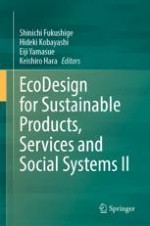2024 | OriginalPaper | Chapter
21. Environmental Impact Assessment of Tomato Consumption Using Life Cycle Assessment from Cultivation to Cooking
Authors : Misaki Takemoto, Aoi Kubota, Kiyoshi Dowaki
Published in: EcoDesign for Sustainable Products, Services and Social Systems II
Publisher: Springer Nature Singapore
Activate our intelligent search to find suitable subject content or patents.
Select sections of text to find matching patents with Artificial Intelligence. powered by
Select sections of text to find additional relevant content using AI-assisted search. powered by
